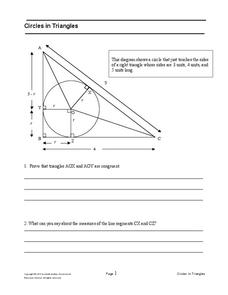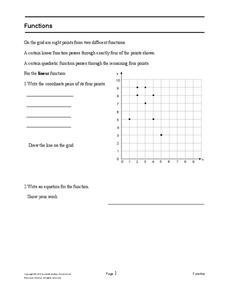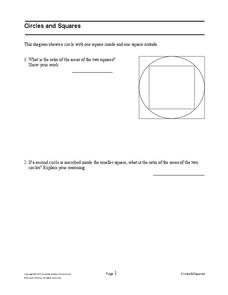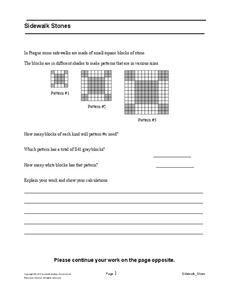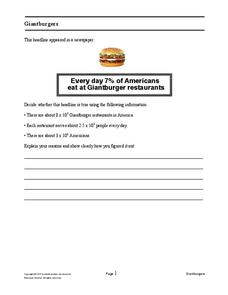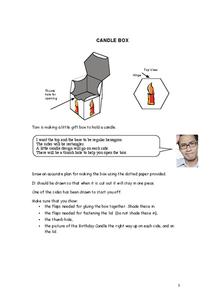Mathematics Assessment Project
Floor Pattern
You'll never look at floor tiles the same again. An assessment task prompts learners to investigate relationships between patterns involving squares and kites to determine angle measurements. They then prove...
Mathematics Assessment Project
Sugar Prices
Sugar rush! In this assessment task, learners interpret points on a scatter plot representing price versus weight for bags of sugar. They then determine the bag that represents the best value.
Mathematics Assessment Project
Sidewalk Patterns
Sidewalk patterns ... it's definitely not foursquare! Learners investigate patterns in sidewalk blocks, write an expression to represent the pattern, and then solve problems using the expressions.
Mathematics Assessment Project
Circles in Triangles
Circles, and triangles, and tangents, oh my! In the assessment task, learners first answer questions leading to the radius of an inscribed circle for a given right triangle. They then use the result to independently determine the...
Mathematics Assessment Project
Functions
After identifying which of the given coordinate points fall on the graph of a line and which fall on the graph of a parabola, pupils write equations for each function.
Mathematics Assessment Project
Circle Pattern
Cool circle patterns! To investigate patterns of shading in circles, learners use the values for specific examples of the pattern to generate a verbal rule for the arrangement.
Mathematics Assessment Project
Funsize Cans
Designing fun-size cans ... what fun! Class members use the provided questions to determine the dimensions of a can with a minimum surface area for a given volume. The task allows learners to use graphs or algebraic manipulation to...
Mathematics Assessment Project
Patchwork
Sew up learning on writing rules for patterns with an assessment task that has pupils investigate the number of triangles needed for cushions of different sizes. They then use the data to generate a rule for a cushion of any size.
Mathematics Assessment Project
Propane Tanks
As an assessment task, learners must determine the radius of a new tank that has double the capacity of a given tank. Task tests knowledge of determining volumes of cylinders and spheres.
Mathematics Assessment Project
Circles and Squares
Squares, and circles ... and squares, and more circles. In this high school assessment task, pupils investigate the ratio of areas of two squares that are circumscribed and inscribed in a circle. They then determine the ratio of the area...
Mathematics Assessment Project
Sidewalk Stones
One block, two blocks, white blocks, gray blocks. In the high school assessment task, learners investigate patterns of sidewalk stones to develop a quadratic expression for each colored block. Young mathematicians then use the expression...
Mathematics Assessment Project
Best Buy Tickets
Everyone wants the best price when shopping — no matter what they are trying to buy. Given pricing information, pupils must solve a system of equations to determine the best option for printing tickets.
Mathematics Assessment Project
Bestsize Cans
Traditional calculus problem made simple. In the high school assessment task, learners determine the minimum surface area for a can of a given volume using algebraic and numerical methods to solve the problem. No calculus...
Mathematics Assessment Project
Table Tiling
How many total tiles does it take to tile a table top? Learners apply geometric concepts to determine the number of tiles needed for a specific square table top, and then use the result to create expressions for the number of tiles...
Mathematics Assessment Project
Skeleton Tower
Who doesn't like building blocks? In the task, pupils use a given diagram of a tower to determine the number of needed blocks. Using this information, pupils then develop a function rule relating the height of the tower to the number of...
Mathematics Assessment Project
Giantburgers
Americans love burgers! Pupils determine whether a given claim about burgers is true by reasoning from the provided information. The task involves operations with scientific notation.
Mathematics Assessment Project
“Ponzi” Pyramid Schemes
Use mathematics to show your classes the power of a good model. Young mathematicians analyze the famous Ponzi pyramid scheme using an exponential pattern. They make conclusions on the reliability of the plan and why it is illegal.
Mathematics Assessment Project
Spinner Bingo
Learners are in it to win it for a fun math activity! After comparing Bingo boards to figure out which one is most likely to win, individuals then determine the numbers to choose in order to create a board with the best...
Mathematics Assessment Project
Lottery
A probability activity presents a lottery game as an idea for a fundraiser. Pupils analyze the game to determine the number of possible outcomes, then determine whether the game would be a good way to raise funds and to support...
Mathematics Assessment Project
Candle Box
Individuals draw a net for a hexagonal pyramid — with some stipulations. The net must contain the printed images so they appear correctly on the box, along with tabs to glue the box together.
Curated OER
Expressing Geometric Properties with Equations
Algebra and geometry are not interchangeable. Demonstrate why not with a series of problems that deal with the equations of circles and equations of lines that meet specific criteria.
Mathematics Assessment Project
Creating Equations
Using equations to model events. The resource contains four items that prompt individuals to write and solve basic equations. They must reason abstractly and quantitatively while attending to precision when solving the problems.
Mathematics Assessment Project
Seeing Structure in Expressions
Structure makes everything easier — even math. A helpful resource contains five short problems that require pupils to use the structure of the expressions in order to answer the questions.
Mathematics Assessment Project
Security Camera
Only you can prevent shoplifting. Class members use a given floor plan to investigate the placement of a security camera. They must incorporate knowledge of area and percents to complete the task.





